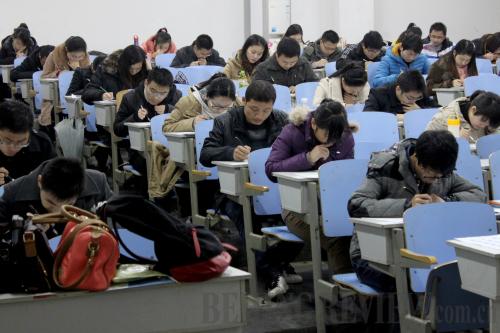|
 |
|
FIERCE COMPETITION: Applicants sit the National Civil Service Exam at Hefei Academy in Anhui Province on November 25, 2012 (XINHUA) |
Holding public office is highly sought after in China, as evidenced by the fierce competition among university graduates for such jobs.
In October, 1.52 million people registered for the National Civil Service Exam to be held later this year, most of them to graduate in 2014. More than 130 central government departments plan to recruit about 19,000 people altogether next year, according to official data. On average, 77 applicants compete for one job, with the most competed position attracting more than 7,000 applicants.
Competitive positions
Every year, more than 6 million college graduates begin searching for jobs, though there are not enough job vacancies to accommodate all of them, said Yin Weimin, Minister of Human Resources and Social Security.
Ma Qingyu, a professor at the Chinese Academy of Governance, said that during this transitional period for society, competition in many industries is becoming more severe and jobs are less secure, making civil service positions more attractive.
College graduates also value civil service jobs because the selection process is transparent and the positions are stable and offer decent benefits.
For example, civil servants can be assigned public housing, enjoy government-paid medical insurance and higher pensions after retirement.
A middle-aged man surnamed Li works in a government department in Beijing. His apartment currently has a market value of approximately 5 million yuan ($830,000). As a civil servant, Li bought the apartment at a subsidized price that was one 10th of the market level. His son also attends a prestigious public primary school as his employer signed a partnership contract with the school.
"The benefits of working in government departments allow me a sense of security," a postgraduate student surnamed Li at Beijing Normal University told Xinhua News Agency.
Not all civil servants are content with their jobs. One netizen said that he took the National Civil Service Exam at the insistence of his parents. After working as a civil servant for several years, he found the routine boring. He said that he does not want to live like that for the rest of his life, and hopes to start a business.
Before entering into business in 1985 at the age of 42, Ye Chenghai, now Chairman of the Board of Shenzhen Salubris Pharmaceuticals, was vice mayor of Shenzhen in south China's Guangdong Province.
Asked whether he preferred being a vice mayor or an entrepreneur, Ye answered that he enjoys business more because it gives him more freedom and more challenges.
After leaving public office, Ye first opened several businesses in Shenzhen and not long after, he went to the United States and Latin America. Later Ye returned to China and in 1998 founded Shenzhen Salubris Pharmaceuticals.
Unlike Ye, some civil servants with entrepreneurial dreams choose to do business in their spare time, although that is against the Civil Service Law.
"As the income gap grows during the economic and social transitional period, some public employees feel psychologically torn. On the one hand, they envy the rich for their affluent lifestyle; on the other hand, they are unwilling to give up their stable income and benefits. A small number of civil servants engage in business in violation of regulations," said Huang Weiting, former Associate Editor in Chief of Hongqi Publishing House in Beijing.
| 